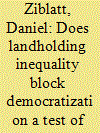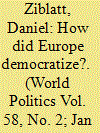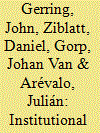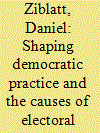|
|
|
Sort Order |
|
|
|
Items / Page
|
|
|
|
|
|
|
| Srl | Item |
| 1 |
ID:
083782


|
|
|
|
|
| Publication |
2008.
|
| Summary/Abstract |
Recent cross-national studies have returned their attention to the structural determinants of political regimes, highlighting in particular the factor of "landholding inequality" as a decisive barrier to democratization. This article provides the first systematic test of such hypotheses at the microlevel and proposes a new account of authoritarianism's durability by examining the crucial case of pre-World War I Prussia. The article analyzes the results of a roll-call vote on a watershed piece of legislation that was defeated on the eve of World War I-legislation that would have democratized suffrage rules in Germany's largest state. When examined systematically, this historically and theoretically important vote reveals two surprising lessons: first, landholding inequality undercuts the prospects of democratization even holding income inequality constant. Second, the nature of elite competition and electoral considerations, shaped by the institutional configuration of nondemocratic regimes, can also thwart democratization, even when socioeconomic conditions may appear to make a society ripe for regime change.
|
|
|
|
|
|
|
|
|
|
|
|
|
|
|
|
| 2 |
ID:
074560


|
|
|
|
|
| Publication |
2006.
|
| Summary/Abstract |
How was democracy achieved in nineteenth-century Europe? This article reviews fours recent books that bring democracy's first wave "back in" to mainstream political science. By launching an important two-way interchange between earlier and subsequent waves of democratization, the books address three core questions: what prompts democratic openings; who are the most important actors in the push for democratization; and once undertaken, how is democracy secured. The four works offer different and at times competing answers to these questions, but all suggest that democracy's first wave was neither exceptional nor inevitable. Instead, it was marked by its own share of concessions and uncertainties, indicating the enduring relevance of Europe's democratization for contemporary cases.
|
|
|
|
|
|
|
|
|
|
|
|
|
|
|
|
| 3 |
ID:
106331


|
|
|
|
|
| Publication |
2011.
|
| Summary/Abstract |
Most governance arrangements involve spatial units with highly unequal powers, for example, a feudal monarchy and its principalities, an empire and its colonies, a formal empire and an informal empire (or sphere of influence), a national government and its subnational entities, or a regional government and its local entities. In this situation, the dominant unit (A) usually enjoys some discretion about how to institutionalize its authority over the subordinate unit (B). An important element of this decision concerns how much authority should be delegated to the weaker unit. The authors simplify this dimension of governance along a continuum of "direct" and "indirect" styles of rule. Why, in some cases, does one find a relatively direct (centralized) system of rule and in others a relatively indirect (decentralized) system of rule? While many factors impinge on this decision, the authors argue that an important and highly persistent factor is the prior level of centralization existing within the subordinate unit. Greater centralization in B is likely to lead to a more indirect form of rule between A and B, all other things being equal. The authors refer to this as an institutional theory of direct/indirect rule. Empirical analyses of this hypothesis are applied to patterns of direct and indirect rule (1) during the age of imperialism and (2) across contemporary nation-states. The article concludes by discussing applications of the theory in a variety of additional settings.
|
|
|
|
|
|
|
|
|
|
|
|
|
|
|
|
| 4 |
ID:
090821


|
|
|
|
|
| Publication |
2009.
|
| Summary/Abstract |
Why is there so much alleged electoral fraud in new democracies? Most scholarship focuses on the proximate cause of electoral competition. This article proposes a different answer by constructing and analyzing an original data set drawn from the German parliament's own voluminous record of election disputes for every parliamentary election in the life of Imperial Germany (1871-1912) after its adoption of universal male suffrage in 1871. The article analyzes the election of over 5,000 parliamentary seats to identify where and why elections were disputed as a result of "election misconduct." The empirical analysis demonstrates that electoral fraud's incidence is significantly related to a society's level of inequality in landholding, a major source of wealth, power, and prestige in this period. After weighing the importance of two different causal mechanisms, the article concludes that socioeconomic inequality, by making elections endogenous to preexisting social power, can be a major and underappreciated barrier to the long-term process of democratization even after the "choice" of formally democratic rules.
|
|
|
|
|
|
|
|
|
|
|
|
|
|
|
|
|
|
|
|
|